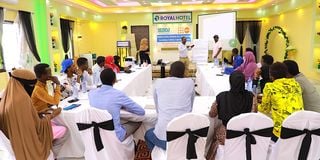Premium
As world celebrates democracy, Somalia media yearn for more freedoms

Somalia's journalists at a past training on coverage of female genital mutilation, under the UNFPA programme.
What you need to know:
- In a declaration to mark the UN day meant for celebrating civil liberties, Somalia’s youth and media lobbies said the ongoing elections should establish leaders who will safeguard their freedoms.
Somalia’s youth and journalists said Wednesday that they want more freedoms and a government that can guarantee them, as the world marked the International Day of Democracy.
In a declaration to mark the UN day meant for celebrating civil liberties, Somalia’s youth and media lobbies said the ongoing elections should establish leaders who will safeguard their freedoms.
“More than ever, political leadership and statesmanship is now needed to ensure journalists and news media organisations operate in an atmosphere free of threats and harassment, and where information is freely accessible to citizens,” said Omar Faruk Osman, secretary-general of the National Union of Somali Journalists, a lobby that promotes rights of the media practitioners.
“A free and independent media, where journalists work in a safe and secure environment, is a key pillar in the quest for durable peace and democratic governance in Somalia” he added.
Election system
Somalia is conducting its long-delayed elections until October 10, but the polls are mainly indirect, meaning the actual stakeholders may have little to do with the elected leaders.
And although the electoral agreement signed earlier in May calls for affirmative action, and for nominations for elections to be as inclusive as possible, the powers still lie with the nominating authorities: federal presidents who select people to be approved by local assemblies before they become MPs.
It is these MPs who will then vote for the President.
That lack of public participation may be contributing to a detached leadership, which activists say has made leaders unresponsive to calls for freedoms and other rights.
In a declaration on Wednesday, the journalists’ unionsaid both levels of government in Somalia - federal and state - have violated media freedoms including through harassment of journalists.
“Such actions and measures are incompatible with the principles of democracy which this day is about. Somali authorities, wherever they are, need to stop the rhetoric about democracy and make sure their actions are consistent with democratic norms,” the union said.
In Somalia, at least a dozen journalists were detained last year, while another 133 were harassed or threatened, according to the annual Media Freedom Report 2021.
This year, 14 journalists filed complaints on threats, the group says, but the overall problem is compounded by insecurity as al-Shabaab terror group still occupies some parts of the country.
What countries must do
The International Day of Democracy is marked every September 15, but African countries have used the occasion as part of the amnesty and reconciliation month.
In a statement to mark the International Day of Democracy, African Union Commissioner (AUC) for Political Affairs, Peace and Security, Bankole Adeoye, said African countries must increasingly respect constitutions and ensure civil liberties for the continent to prosper.
The statement on Wednesday said the AU diplomat “urges African governments to continue to foster democracy and good governance by upholding the cherished values of transparency, accountability, the rule of law, fundamental freedoms and human rights, equality”.
“This way, new conflicts will be prevented, peace and security will be sustained, and prosperity will flourish,” it said.
Ambassador Adeoye said many Africans, including the youth, have high hopes in their countries but must be helped to realised their dreams through ensuring the vote is credible and that no coups take place, and by being provided with opportunities, as well as respect for their rights.
He reiterated that strengthening democracy for human security connotes responding to the changing continental and global dynamics by leveraging technology and innovation, and creating smart partnerships to attain the sustainable growth and development enshrined in Agenda 2063.
“Citizen participation is essential to build and strengthen trust, unite societies and invariably support stronger democracy in AU member states. The AUC continues to underline that democracy must ensure the participation of all, inclusive of the marginalised - the youth, women and people living with disabilities,” the statement said.
UN Secretary-General Antonio Guterres said Covid-19 has added to the challenge of ensuring democracy as countries try to control information flow, as well as cyber bullying and illegal detention of journalists.
“The crisis raises the question of how best to counter harmful speech while protecting freedom of expression,” Guterres said.
“Sweeping efforts to eliminate misinformation or disinformation can result in purposeful or unintentional censorship, which undermines trust. The most effective response is accurate, clear and evidence-based information from sources people trust.”






